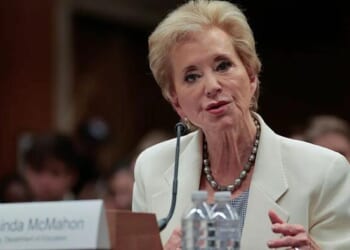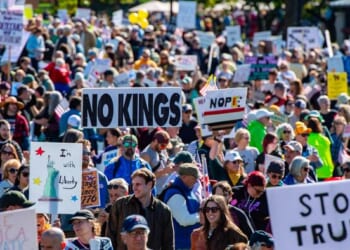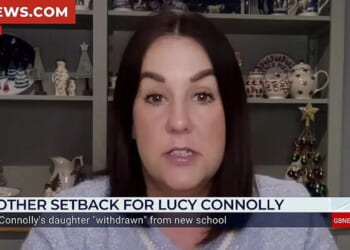Submitted by Thomas Kolbe
In its latest annual report, Germany’s Council of Economic Experts — once regarded as a market-oriented corrective to government excess — has presented what can only be described as a courtesy opinion. Rather than challenging the political status quo, the five “wise men” largely echo Berlin’s own agenda: more state intervention, higher taxes, and tighter regulation.
On Wednesday, the council presented its annual report at the federal press conference. For the first time, Chancellor Friedrich Merz received the economists’ assessment in person. What they handed him, however, reads less like independent advice and more like a compilation of familiar political slogans.
At the top of the list stands — yet again — the call for “cutting bureaucracy,” a mantra repeated endlessly but never realized. Meanwhile, the council ignores the core problem: the German economy is suffocating under its own regulatory machinery. In the past three years alone, businesses have had to hire roughly 325,000 additional staff just to deal with the avalanche of new rules — a massive diversion of resources that adds nothing to productivity.
Bureaucratic Strangulation, Military Keynesianism
Among the council’s key recommendations is “more joint procurement and innovation” in the defense sector — another item perfectly aligned with government priorities. Together with its uncritical support for climate policy, the report reveals how deeply the economists have internalized state narratives.
Instead of questioning the economic burden of the artificial “green industry,” which drags down productivity across all sectors, the council now embraces the logic of a war economy as the next growth engine. The parallels are disturbing. Rather than recalibrating Germany’s economic compass, the report doubles down on the same failed assumptions: more state, more coordination, less individual responsibility.
Phantom Growth, Real Debt
When it comes to growth, the council again mirrors the government’s projections. Both the experts and the Economics Ministry expect a meager 0.2% GDP growth for 2025. That means the massive, debt-financed stimulus packages — which will push public debt up sharply in the coming years — have already fizzled out.
With the state share at roughly 50% of GDP and net new borrowing around 4.2% (including special funds and off-balance items), the implication is devastating: the private economy has contracted by more than 4%.
This is a resounding failure of the government’s Keynesian strategy — yet the economists respond not with structural criticism but with timid nods to bureaucracy reform, while otherwise parroting eco-socialist talking points.
Inheritance Tax: The New Redistribution Tool
The council’s most controversial proposal concerns inheritance taxation. Once a bastion of market-oriented reasoning, the body now advocates raising taxes on inherited business assets, denouncing the current exemptions as “socially unjust.” The language could have been lifted straight from the Green Party’s manifesto.
Specifically, the report suggests limiting the tax exemption for business assets to €26 million, and either abolishing or sharply restricting relief for larger inheritances. Payment deferrals would be introduced to avoid liquidity crises during succession.
Behind the talk of “asset mobility,” however, lies a distinctly socialist vision — one aimed at broader redistribution and fiscal relief for the state.
Meanwhile, Germany’s real debt (including special funds and hidden borrowing) will rise by over 5% next year. Yet the council sees no problem, as long as Berlin remains in the good company of the EU’s “debt club.”
The State as Sacred Cow
Any notion of shrinking government or ending the interventionist spiral has vanished. The council now fully embraces the political orthodoxy. In doing so, it breaks decisively with the principles of private property and free enterprise, aligning itself intellectually with Marcel Fratzscher’s DIW — a think tank long known for its statist bias.
The report even promotes a state-guided “retirement savings fund” that would channel private investment toward politically defined objectives — above all, climate policy. Once again, the state seeks to steer private capital allocation while dressing it up as “financial inclusion.”
The underlying message is unmistakable: the state is no longer the problem, but the solution.
Even by Berlin standards, this marks a profound paradigm shift.
The Fall of the Economic Council
The council’s ideological transformation — especially in its endorsement of higher inheritance taxes — is a turning point. It confirms what many suspected: Berlin’s bureaucracy has wrapped itself in a belt of compliant advisors, ensuring that no fundamental market-liberal critique can pierce its walls.
Now, even family-owned businesses are to be fed into the meat grinder of redistribution. This represents the low point of a once-proud institution that has steadily drifted away from the foundations of economic freedom.
The principle of private property, generational continuity, and the right to dispose freely of one’s already-taxed assets — all this has been subordinated to the new orthodoxy of “social justice.”
If economists truly value civilizational progress, these principles should be their starting point, not their target.
It is a bitter moment for German academia — assuming one can still call it that.
* * *
About the author: Thomas Kolbe, born in 1978 in Neuss/ Germany, is a graduate economist. For over 25 years, he has worked as a journalist and media producer for clients from various industries and business associations. As a publicist, he focuses on economic processes and observes geopolitical events from the perspective of the capital markets. His publications follow a philosophy that focuses on the individual and their right to self-determination.
Loading recommendations…
















